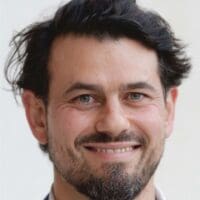
According to the UN High Commissioner for Refugees (UNHCR), more than 108 million people are forcibly displaced worldwide, the highest level on record. By 2050, this figure is expected to rise to 200 million—and potentially to over a billion—due to climate change and natural disasters.
Such statistics belie the reality that each and every one of these individuals has a name, a story, and a life on hold. The injustice, loss, and uncertainty they face leaves refugees and asylum seekers highly vulnerable to posttraumatic stress, depression, and related mental health challenges. Such challenges also contribute to social alienation, chronic post-migration stressors, and the intergenerational transmission of trauma to children.
“The global human rights crisis has contributed to a global mental health crisis,” says Amit Bernstein, a professor of psychology and founder and director of the Observing Minds Lab at the University of Haifa in Israel. To help foster healing “one moment at a time,” Amit and his team of students and asylum seekers developed Mindfulness-Based Trauma Recovery for Refugees (MBTR-R), a trauma-sensitive mindfulness and compassion training intervention. The nine-week program has now been tested and adapted to meet the needs of diverse populations of asylum seekers and refugees from North Africa to Ukraine.
“The global human rights crisis has contributed
to a global mental health crisis.”
–Amit Bernstein
In 2020, Amit was awarded a Mind & Life PEACE grant to explore whether MBTR-R enables pro-social healing among asylum seekers. For example, does it foster feelings of safety and trust among participants? Can it make them more caring and supportive of romantic partners, friends, and family members? And can it motivate individuals to engage more with their community?
Through the grant, Amit and his team are studying the impact of a mobile-health adaptation of MBTR-R called Mindfulness-SOS for Refugees. Study participants are Eritrean asylum seekers in Israel, many of whom have experienced human rights abuses from arbitrary detention, torture, and sexual and gender-based violence to religious and political persecution. A secondary aim is to test whether Mindfulness-SOS leads to improved trauma- and stress-related mental health outcomes.
The PEACE Grant is just one of a number of studies Amit and his team have undertaken to better understand the needs of African asylum seekers in Israel and how MBTR-R and Mindfulness-SOS can be most effective. They do this work through an inter-cultural, community-based clinical science laboratory embedded in the heart of the refugee community. The team, which includes students as well as members of the refugee and asylum-seeker community, works on the ground in close collaboration with NGOs, municipal organizations, and leaders within refugee and asylum-seeker communities.
Research undertaken by the Observing Minds Lab found refugees who succeeded to recover and thrive found a way to create a felt sense of safety and belonging within their lived experience. This work led to the Moments of Refuge project and the rationale to apply mindfulness and compassion to support the recovery and empowerment of forcibly displaced communities. Toward this end, the MBTR-R program, and its mobile-health adaptation Mindfulness-SOS, seek to “cultivate a subjective sense of sanctuary within and alongside the often uncontrollable and painful realities refugees and asylum seekers experience,” says Amit.
The Moments of Refuge project team is now working to expand the science and impact of their group and mobile-health programs among forcibly displaced communities in the Middle East and other parts of the world. For example, through Moments of Refuge for Ukraine, the team is working with displaced and war-affected Ukrainians. They have found that displacement has led to a significant—and growing—mental health crisis among Ukrainians. The team hopes that a randomized controlled study of their mindfulness- and compassion-based training may prove helpful to prevent poor long-term mental health and related consequences among Ukrainians.
Amit expects to complete the PEACE grant-funded randomized trial—testing the pro-social and multi-systemic effects of mindfulness and compassion training among African asylum-seekers—this coming spring, with findings to be published by the end of 2024.
In the absence of solutions that could prevent forced displacement, Amit seeks to create conditions that can contribute to greater well-being for refugees and asylum seekers—now and in the future. “It’s our collective ethical obligation,” he says, “to bring the most rigorous, ambitious, and compassionate science we can envision to empower and help care for the forcibly displaced.”


